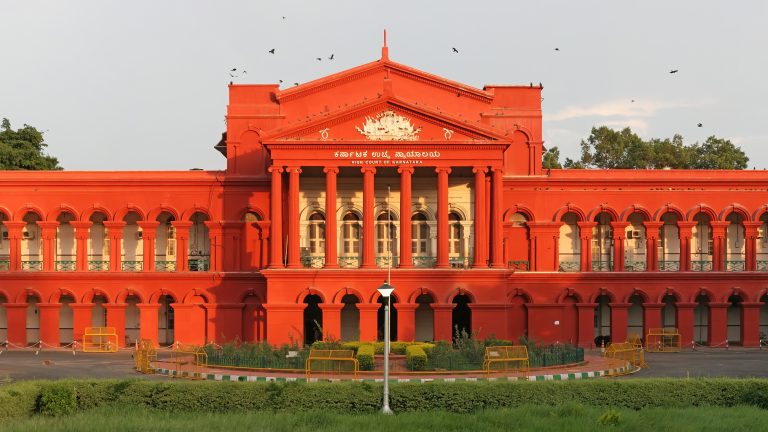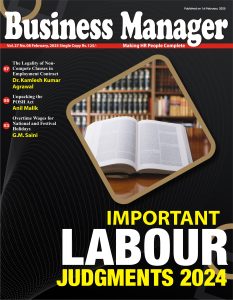The Court held thus in a writ petition filed by a company challenging the legality and correctness of the order of reference made by the State Government.
A Single Bench of Justice K.S. Hemalekha observed, “Settled legal preposition is that jural relationship of the employer and employee comes to an end in case of retirement, voluntary retirement, resignation. … In the instant case, employees who have voluntarily retired from service and having accepted the benefits under the voluntary retirement package announced by the management cannot be treated as workman as envisaged under Section 2(s) of the ID Act.”
The Bench said that once the workman has opted for voluntary retirement and having taken all the benefits under the VRS Scheme, the workman cannot now contend/dispute that the voluntary retirement was obtained by force or undue influence.
Advocate C.K. Subrahmanya appeared for the petitioner while HCGP Spoorthi V. appeared for the respondents.
Brief Facts –
The Voluntary Retirement Scheme (VRS) was floated by the petitioner company in the year 2020 and 46 employees had voluntarily opted to avail the benefits under the same. Five employees voluntarily tendered resignation and nominated a person of their choice as a nominee in case of untoward incident. The Management accepted their offers of voluntary retirement/resignation and relieved them from the service.
Also read: Kerala High Court Asserts that Employment Cannot Be Denied Based Solely on Diabetes
51 employees claimed gratuity under the Payment of Gratuity Act, 1972 by submitting prescribed application. 46 of them relived under VRS after obtaining a no-due certificate and remaining 5 were relieved after accepting their resignation and settling entire service benefits. The memorandum of settlement was signed by the said 46 employees, the company made payments, and it cleared all the statutory benefits. The question that arose for consideration before the court was –
“Whether the order of reference made under Section 10 (1) of the Industrial Disputes Act, 1947 (‘ID Act’ for short) would raise a question of industrial dispute in the event the employee has voluntarily retired from service and has accepted the benefits of voluntary retirement, can be treated as a workman as defined under Section 2(s) of the ID Act?”
The High Court in view of the facts and circumstances of the case noted, “The relationship of the employer and employee comes to an end on receipt of his retirement benefits. This is not a case where the infirmity in the reference can be shown only after evidence has been adduced, it would be a futile exercise, if the dispute were referred to the Industrial Tribunal. Once an application is made by the employee and accepted by the employer, the contract gets concluded and both the parties are bound by the terms and conditions as contained under the voluntary retirement scheme.”
The Court added that the employees, having taken the entire benefits, cannot seek the revaluation of the amount of voluntary retirement scheme benefits and the reference made by the appropriate government would not be justified. It further said that as per the settled legal position, it is a precondition to deposit the entire amount received, including the service benefits before making any further claim.
“The person who seeks equity must do equity” and the workmen claim benefits as workmen of the company, but they do not want to part with the benefits they have received towards retirement and the severance of the relationship between master and servant. It simply cannot be permitted. The respondent herein having failed to deposit the settlement amount, initiation of proceedings and adjudication by the respondent is not justifiable”, it held.
The Court also observed that in the case, neither the dispute is in existence nor is the dispute apprehended since employees have admitted that they have opted for voluntary retirement from service and the benefits received under the scheme and this being the position, the Government ought to have arrived at a subjective satisfaction as to whether a prima-facie dispute is in existence or is apprehended from the material on record.
“… it is evidently clear that the appropriate government has mechanically referred the matter without discharging its obligation as required under law and a serious error of law has been committed by the appropriate authority, which is apparent on the face of the record”, it concluded.
Accordingly, the High Court allowed the writ petition and quashed the order of reference made by the government.
Cause Title- Triveni Turbine Limited v. Government of Karnataka & Ors.
Appearance:
Petitioner: Advocate B.C. Prabhakar
Respondents: Advocate K.B. Naveen Kumar
Source: verdictum
Stay connected with us on social media platforms for instant updates click here to join our LinkedIn, Twitter & Facebook



































